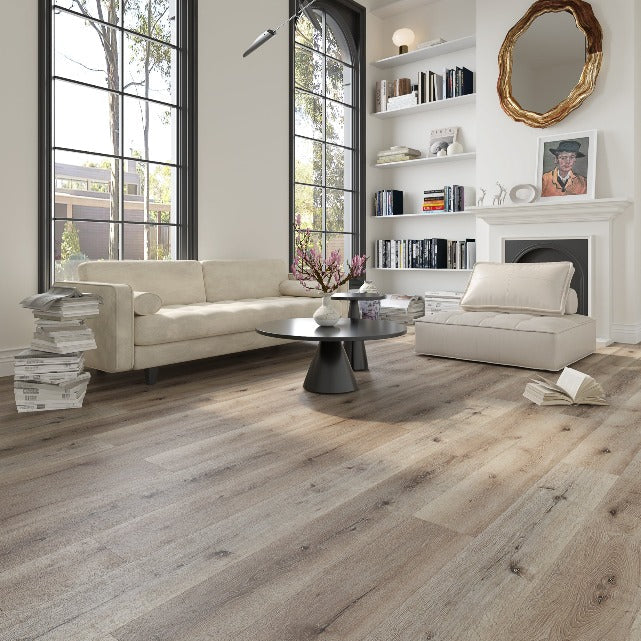
When choosing the right flooring for an apartment, practicality, style, and long term durability are key. Among the most popular options in the UK today are SPC (Stone Plastic Composite) flooring and traditional LVT/Vinyl (Luxury Vinyl Tile). Both offer great performance, but they differ in structure, feel, and suitability for various living environments.
If you’re renovating or fitting out a UK apartment, this comparison will help you decide whether SPC or LVT / Vinyl is the better option for your space.
Understanding the Basics
What Is Traditional LVT/Vinyl?
Luxury Vinyl/LVT Tile is a multi layer synthetic flooring that mimics the appearance of wood, stone, or tile. It’s flexible, moisture resistant, and relatively easy to install. Traditional LVT/Vinyl comes in glue down or click lock formats and is known for its comfort underfoot.
What Is SPC Flooring?
SPC is an advanced type of vinyl/LVT flooring that includes a rigid stone composite core. This makes it denser and more dimensionally stable than standard LVT/Vinyl. It also comes in click fit formats, often with integrated underlay for sound insulation.
Why SPC Flooring May Be Better for Apartments
UK apartments, particularly in cities like London, Manchester, or Birmingham, often come with specific flooring challenges limited subfloor quality, sound transfer between floors, and a need for easy maintenance. SPC flooring handles these issues well.
1. Stability in Varying Conditions
SPC’s rigid core means it resists changes caused by indoor heating or seasonal fluctuations, which is especially useful in centrally heated flats or top floor apartments.
2. Better Sound Insulation
Many SPC planks come with a pre attached underlay that helps reduce footfall noise. This is particularly helpful for apartment living, where noise transmission to downstairs neighbours can be a concern.
3. Suitable for Slightly Uneven Subfloors
If your apartment subfloor isn’t perfectly level, SPC’s rigid structure can hide minor imperfections without telegraphing them through the surface.
4. Easy Installation
For rented or buy to let flats, click fit SPC can be laid quickly and removed if necessary, making it a flexible option for landlords or renovators.
When Traditional LVT/Vinyl Still Makes Sense
While SPC is more rigid, traditional LVT/Vinyl has advantages where comfort and flexibility are important.
-
Ideal for bedrooms or nurseries where a softer feel is desired
-
Works well with underfloor heating, as it adapts quickly to temperature changes
-
Suitable for high design spaces, as it often offers more surface texture options
-
Easier to cut and shape for complex room layouts
If your apartment is well insulated and has a solid subfloor, traditional LVT/Vinyl remains a good option particularly in spaces where warmth and comfort underfoot matter more than ultimate durability.
Price and Value Consideration
SPC flooring often comes at a slightly higher cost than traditional LVT/Vinyl, due to its enhanced core and added features like built in underlay. However, this added upfront investment can be justified by:
-
Lower installation costs
-
Less maintenance over time
-
Greater durability in high use areas
-
Reduced need for subfloor levelling
If you’re renovating for long term living or letting, SPC may offer better value over time.
Choosing What Works for Your Apartment
The decision between SPC and traditional LVT/Vinyl comes down to how your space is used and what you prioritise most comfort, durability, cost, or sound control.
Choose SPC if:
-
You live in a top floor flat or shared building where soundproofing matters
-
You want durable, low maintenance flooring that handles daily wear
-
Your subfloor isn’t in perfect condition
Choose traditional LVT/Vinyl if:
-
You want a softer, more cushioned surface underfoot
-
Your flat is already well insulated and even
-
You’re focused on cost or working with a tight renovation budget
Get Expert Help on Your Flooring Choice
Still unsure which to choose? Explore our range of SPC and LVT/Vinyl flooring with samples available for home delivery. Our team can help assess your apartment’s layout, usage, and acoustic needs to guide you toward the right product for long term comfort and value.
